Analysis of Global Human Capital at Telequip, Australia: A Case Study
VerifiedAdded on 2020/05/01
|17
|4350
|36
Case Study
AI Summary
This case study examines the challenges faced by Telequip, an Australian company, in managing its global human capital. The analysis delves into various issues, including workplace conflicts stemming from cultural differences between Australian and Taiwanese employees, financial crises due to tax liabilities and project mismanagement, and the impact of climatic conditions and personal problems on employee performance. The study highlights problems like inadequate staff knowledge, poor communication, and the lack of pre-departure training for expats. It further explores issues like poor recruitment, lack of intercultural skills, and inflexible reimbursement systems. The case study identifies the impact of these issues on project deadlines, product quality, and the company's brand image. It underscores the need for improved global project management, effective communication, and better support systems for employees to enhance the company's performance and expansion.
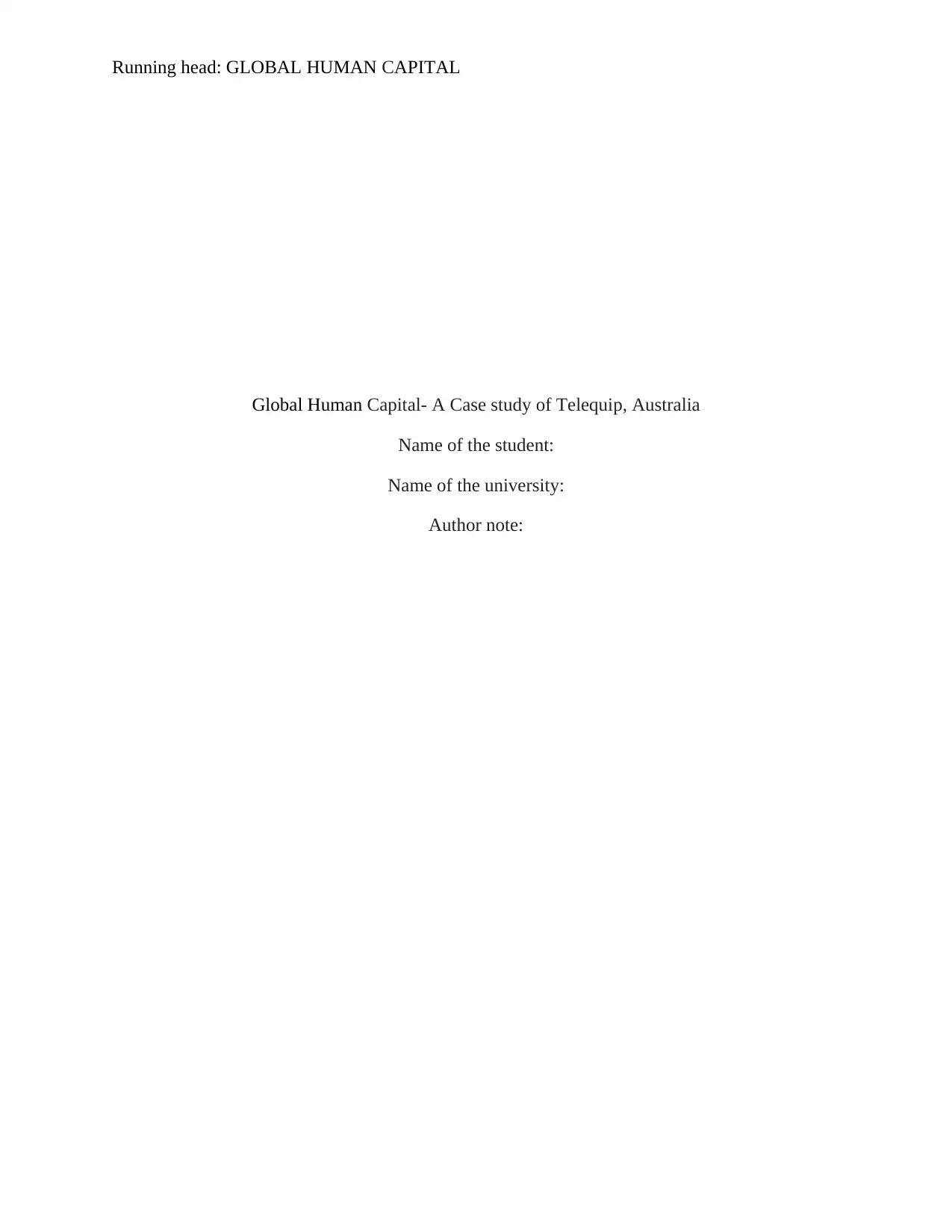
Running head: GLOBAL HUMAN CAPITAL
Global Human Capital- A Case study of Telequip, Australia
Name of the student:
Name of the university:
Author note:
Global Human Capital- A Case study of Telequip, Australia
Name of the student:
Name of the university:
Author note:
Paraphrase This Document
Need a fresh take? Get an instant paraphrase of this document with our AI Paraphraser
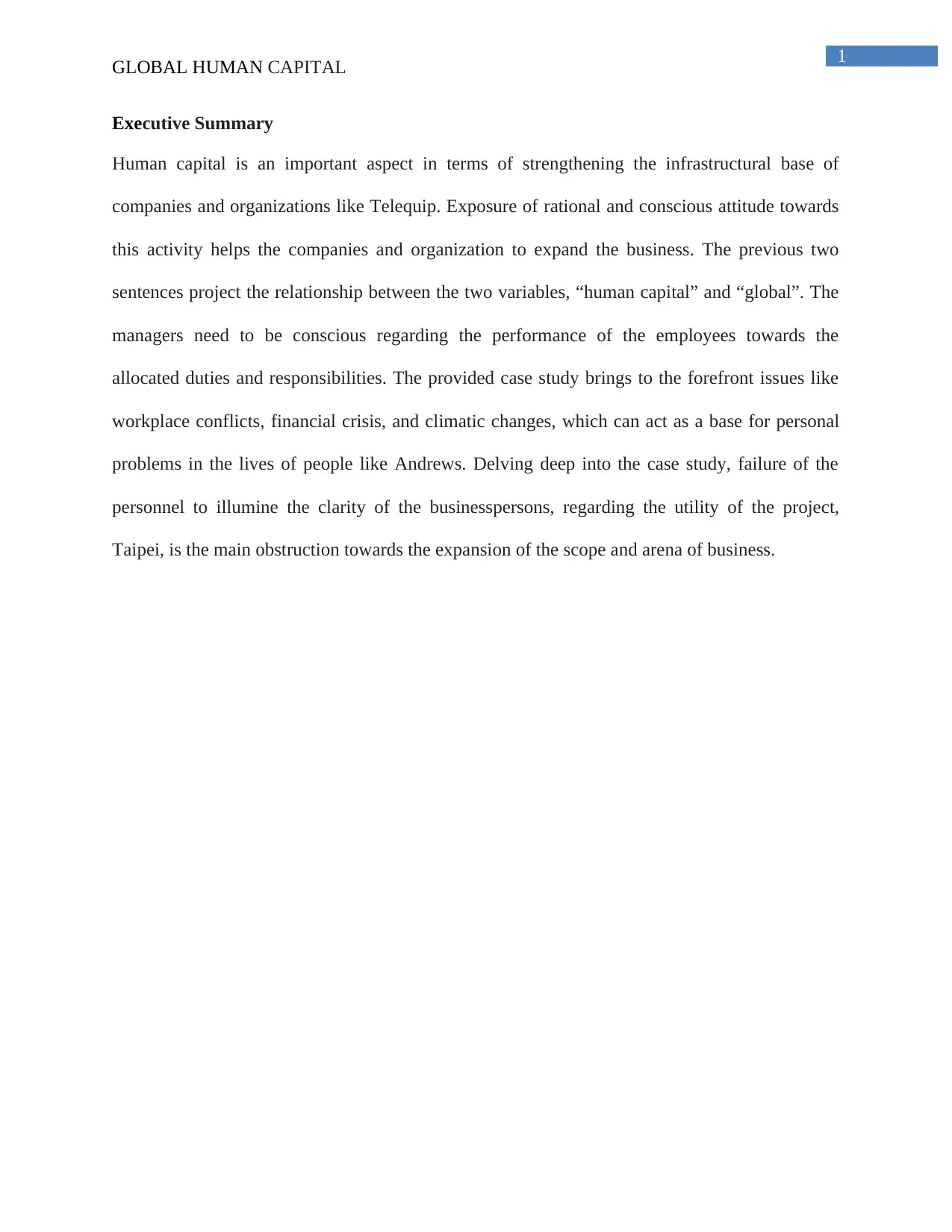
1
GLOBAL HUMAN CAPITAL
Executive Summary
Human capital is an important aspect in terms of strengthening the infrastructural base of
companies and organizations like Telequip. Exposure of rational and conscious attitude towards
this activity helps the companies and organization to expand the business. The previous two
sentences project the relationship between the two variables, “human capital” and “global”. The
managers need to be conscious regarding the performance of the employees towards the
allocated duties and responsibilities. The provided case study brings to the forefront issues like
workplace conflicts, financial crisis, and climatic changes, which can act as a base for personal
problems in the lives of people like Andrews. Delving deep into the case study, failure of the
personnel to illumine the clarity of the businesspersons, regarding the utility of the project,
Taipei, is the main obstruction towards the expansion of the scope and arena of business.
GLOBAL HUMAN CAPITAL
Executive Summary
Human capital is an important aspect in terms of strengthening the infrastructural base of
companies and organizations like Telequip. Exposure of rational and conscious attitude towards
this activity helps the companies and organization to expand the business. The previous two
sentences project the relationship between the two variables, “human capital” and “global”. The
managers need to be conscious regarding the performance of the employees towards the
allocated duties and responsibilities. The provided case study brings to the forefront issues like
workplace conflicts, financial crisis, and climatic changes, which can act as a base for personal
problems in the lives of people like Andrews. Delving deep into the case study, failure of the
personnel to illumine the clarity of the businesspersons, regarding the utility of the project,
Taipei, is the main obstruction towards the expansion of the scope and arena of business.
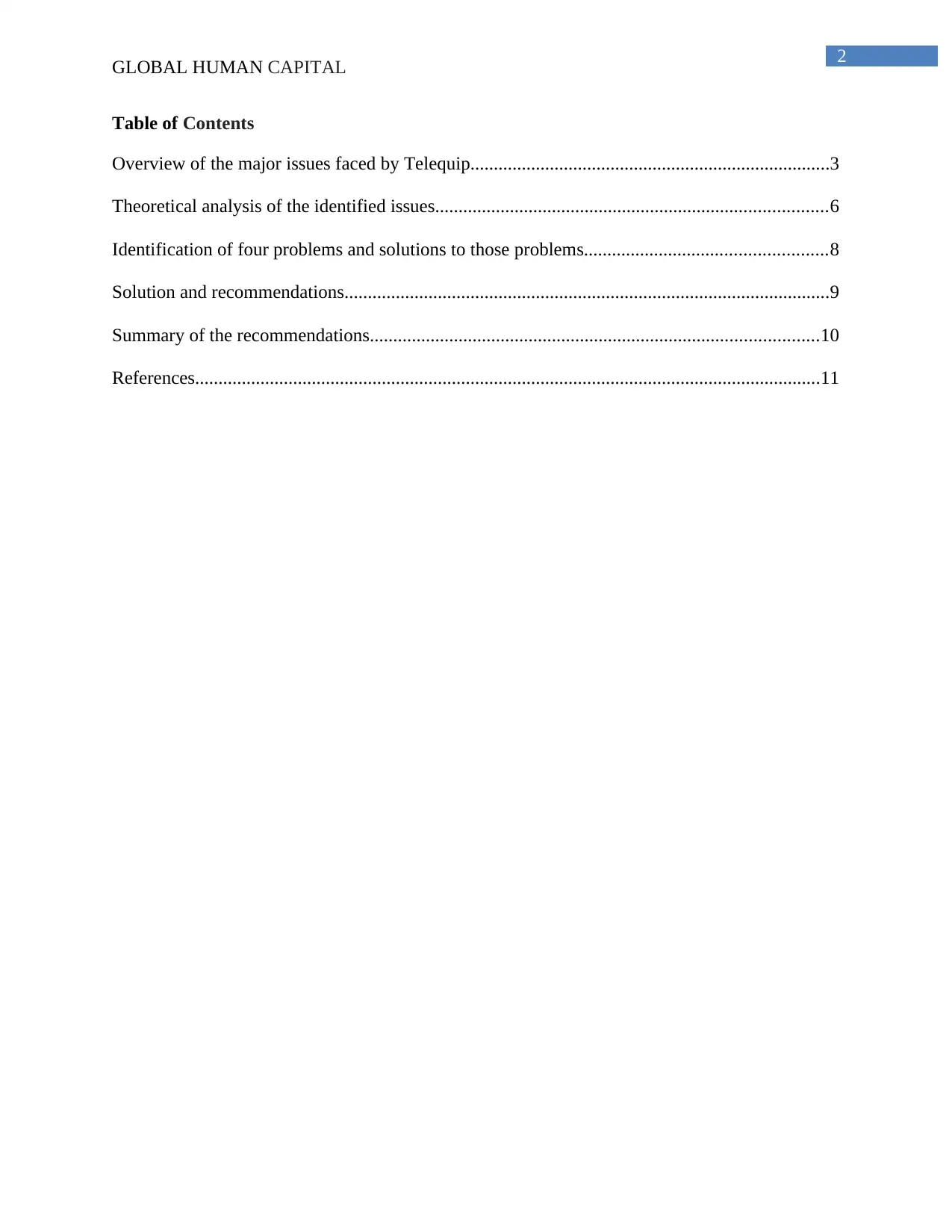
2
GLOBAL HUMAN CAPITAL
Table of Contents
Overview of the major issues faced by Telequip.............................................................................3
Theoretical analysis of the identified issues....................................................................................6
Identification of four problems and solutions to those problems....................................................8
Solution and recommendations........................................................................................................9
Summary of the recommendations................................................................................................10
References......................................................................................................................................11
GLOBAL HUMAN CAPITAL
Table of Contents
Overview of the major issues faced by Telequip.............................................................................3
Theoretical analysis of the identified issues....................................................................................6
Identification of four problems and solutions to those problems....................................................8
Solution and recommendations........................................................................................................9
Summary of the recommendations................................................................................................10
References......................................................................................................................................11
⊘ This is a preview!⊘
Do you want full access?
Subscribe today to unlock all pages.

Trusted by 1+ million students worldwide
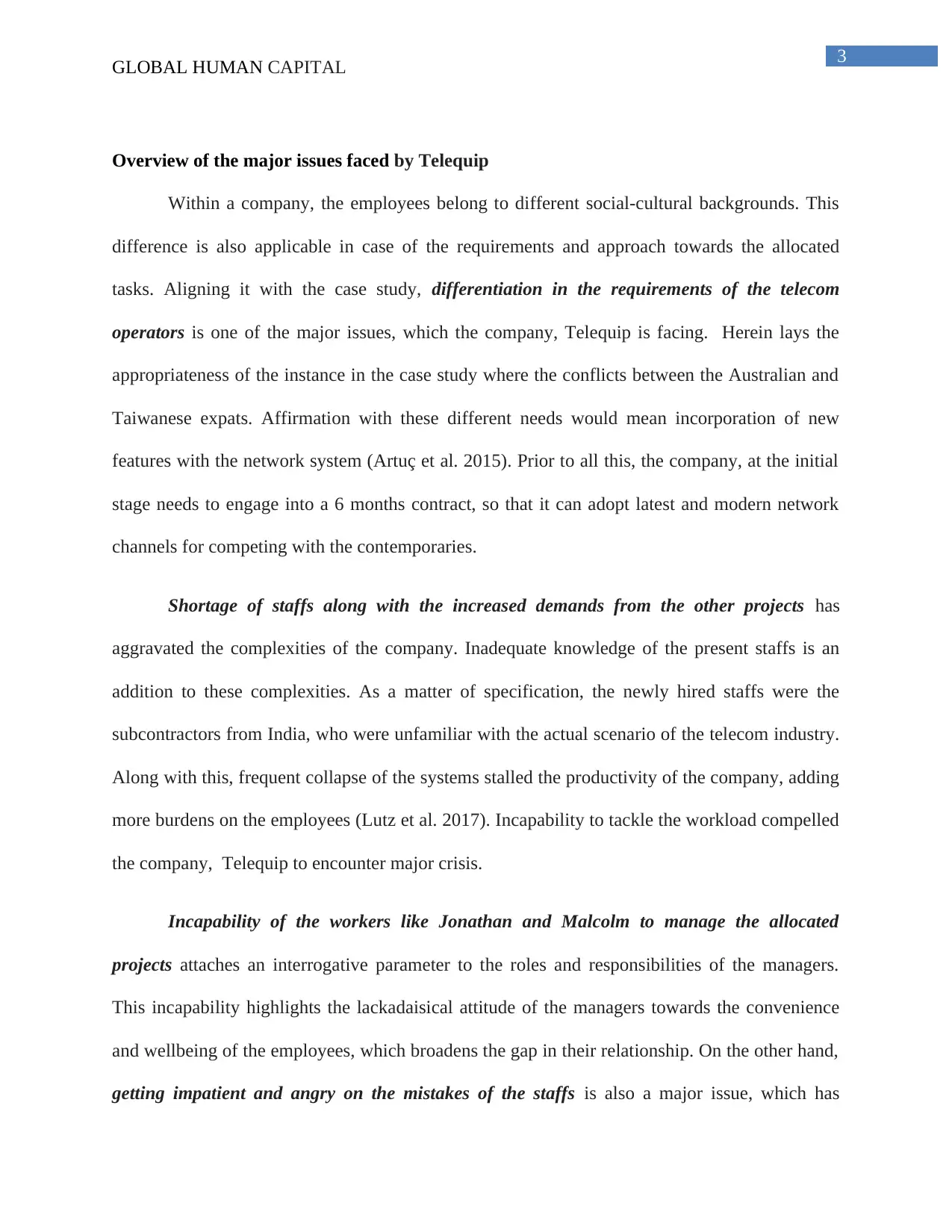
3
GLOBAL HUMAN CAPITAL
Overview of the major issues faced by Telequip
Within a company, the employees belong to different social-cultural backgrounds. This
difference is also applicable in case of the requirements and approach towards the allocated
tasks. Aligning it with the case study, differentiation in the requirements of the telecom
operators is one of the major issues, which the company, Telequip is facing. Herein lays the
appropriateness of the instance in the case study where the conflicts between the Australian and
Taiwanese expats. Affirmation with these different needs would mean incorporation of new
features with the network system (Artuç et al. 2015). Prior to all this, the company, at the initial
stage needs to engage into a 6 months contract, so that it can adopt latest and modern network
channels for competing with the contemporaries.
Shortage of staffs along with the increased demands from the other projects has
aggravated the complexities of the company. Inadequate knowledge of the present staffs is an
addition to these complexities. As a matter of specification, the newly hired staffs were the
subcontractors from India, who were unfamiliar with the actual scenario of the telecom industry.
Along with this, frequent collapse of the systems stalled the productivity of the company, adding
more burdens on the employees (Lutz et al. 2017). Incapability to tackle the workload compelled
the company, Telequip to encounter major crisis.
Incapability of the workers like Jonathan and Malcolm to manage the allocated
projects attaches an interrogative parameter to the roles and responsibilities of the managers.
This incapability highlights the lackadaisical attitude of the managers towards the convenience
and wellbeing of the employees, which broadens the gap in their relationship. On the other hand,
getting impatient and angry on the mistakes of the staffs is also a major issue, which has
GLOBAL HUMAN CAPITAL
Overview of the major issues faced by Telequip
Within a company, the employees belong to different social-cultural backgrounds. This
difference is also applicable in case of the requirements and approach towards the allocated
tasks. Aligning it with the case study, differentiation in the requirements of the telecom
operators is one of the major issues, which the company, Telequip is facing. Herein lays the
appropriateness of the instance in the case study where the conflicts between the Australian and
Taiwanese expats. Affirmation with these different needs would mean incorporation of new
features with the network system (Artuç et al. 2015). Prior to all this, the company, at the initial
stage needs to engage into a 6 months contract, so that it can adopt latest and modern network
channels for competing with the contemporaries.
Shortage of staffs along with the increased demands from the other projects has
aggravated the complexities of the company. Inadequate knowledge of the present staffs is an
addition to these complexities. As a matter of specification, the newly hired staffs were the
subcontractors from India, who were unfamiliar with the actual scenario of the telecom industry.
Along with this, frequent collapse of the systems stalled the productivity of the company, adding
more burdens on the employees (Lutz et al. 2017). Incapability to tackle the workload compelled
the company, Telequip to encounter major crisis.
Incapability of the workers like Jonathan and Malcolm to manage the allocated
projects attaches an interrogative parameter to the roles and responsibilities of the managers.
This incapability highlights the lackadaisical attitude of the managers towards the convenience
and wellbeing of the employees, which broadens the gap in their relationship. On the other hand,
getting impatient and angry on the mistakes of the staffs is also a major issue, which has
Paraphrase This Document
Need a fresh take? Get an instant paraphrase of this document with our AI Paraphraser
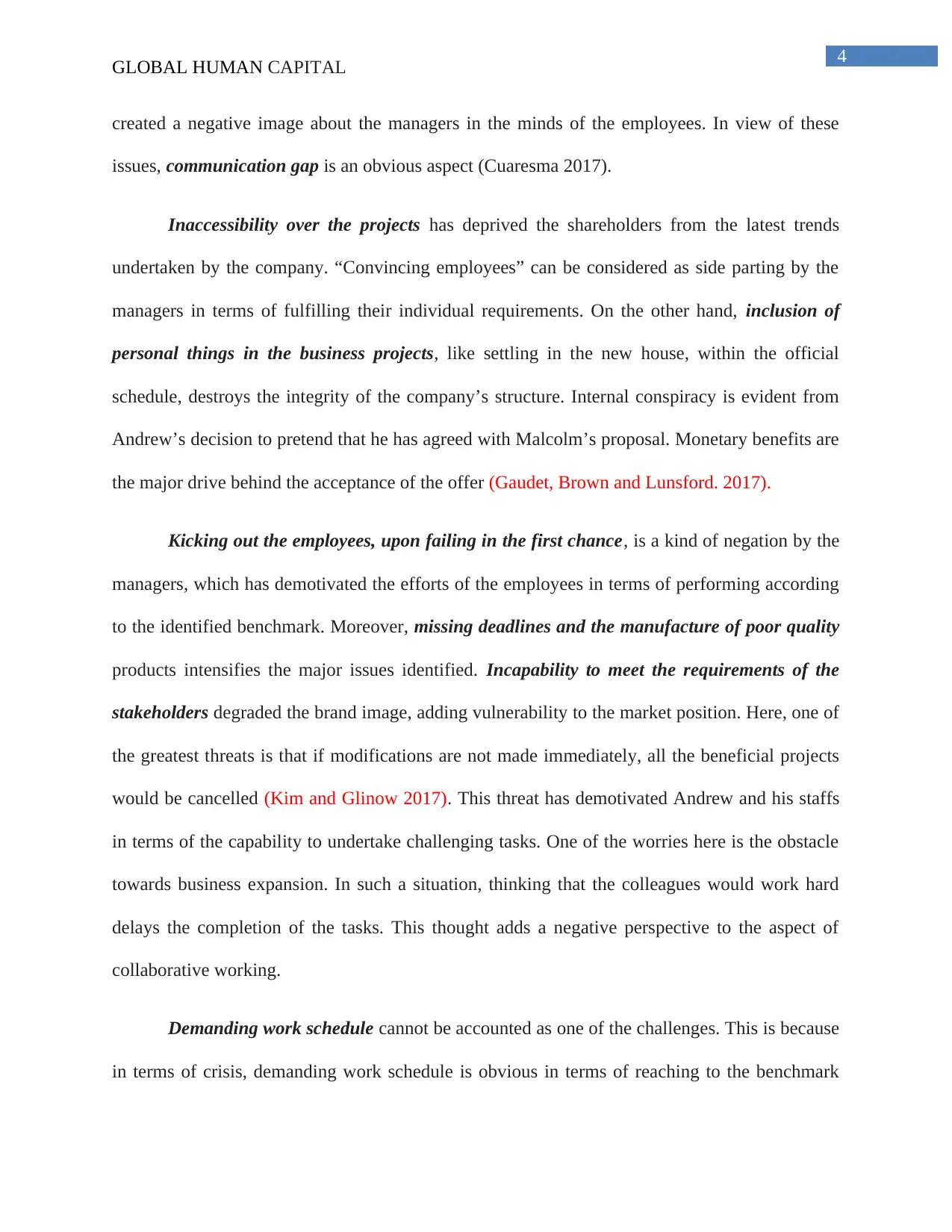
4
GLOBAL HUMAN CAPITAL
created a negative image about the managers in the minds of the employees. In view of these
issues, communication gap is an obvious aspect (Cuaresma 2017).
Inaccessibility over the projects has deprived the shareholders from the latest trends
undertaken by the company. “Convincing employees” can be considered as side parting by the
managers in terms of fulfilling their individual requirements. On the other hand, inclusion of
personal things in the business projects, like settling in the new house, within the official
schedule, destroys the integrity of the company’s structure. Internal conspiracy is evident from
Andrew’s decision to pretend that he has agreed with Malcolm’s proposal. Monetary benefits are
the major drive behind the acceptance of the offer (Gaudet, Brown and Lunsford. 2017).
Kicking out the employees, upon failing in the first chance, is a kind of negation by the
managers, which has demotivated the efforts of the employees in terms of performing according
to the identified benchmark. Moreover, missing deadlines and the manufacture of poor quality
products intensifies the major issues identified. Incapability to meet the requirements of the
stakeholders degraded the brand image, adding vulnerability to the market position. Here, one of
the greatest threats is that if modifications are not made immediately, all the beneficial projects
would be cancelled (Kim and Glinow 2017). This threat has demotivated Andrew and his staffs
in terms of the capability to undertake challenging tasks. One of the worries here is the obstacle
towards business expansion. In such a situation, thinking that the colleagues would work hard
delays the completion of the tasks. This thought adds a negative perspective to the aspect of
collaborative working.
Demanding work schedule cannot be accounted as one of the challenges. This is because
in terms of crisis, demanding work schedule is obvious in terms of reaching to the benchmark
GLOBAL HUMAN CAPITAL
created a negative image about the managers in the minds of the employees. In view of these
issues, communication gap is an obvious aspect (Cuaresma 2017).
Inaccessibility over the projects has deprived the shareholders from the latest trends
undertaken by the company. “Convincing employees” can be considered as side parting by the
managers in terms of fulfilling their individual requirements. On the other hand, inclusion of
personal things in the business projects, like settling in the new house, within the official
schedule, destroys the integrity of the company’s structure. Internal conspiracy is evident from
Andrew’s decision to pretend that he has agreed with Malcolm’s proposal. Monetary benefits are
the major drive behind the acceptance of the offer (Gaudet, Brown and Lunsford. 2017).
Kicking out the employees, upon failing in the first chance, is a kind of negation by the
managers, which has demotivated the efforts of the employees in terms of performing according
to the identified benchmark. Moreover, missing deadlines and the manufacture of poor quality
products intensifies the major issues identified. Incapability to meet the requirements of the
stakeholders degraded the brand image, adding vulnerability to the market position. Here, one of
the greatest threats is that if modifications are not made immediately, all the beneficial projects
would be cancelled (Kim and Glinow 2017). This threat has demotivated Andrew and his staffs
in terms of the capability to undertake challenging tasks. One of the worries here is the obstacle
towards business expansion. In such a situation, thinking that the colleagues would work hard
delays the completion of the tasks. This thought adds a negative perspective to the aspect of
collaborative working.
Demanding work schedule cannot be accounted as one of the challenges. This is because
in terms of crisis, demanding work schedule is obvious in terms of reaching to the benchmark
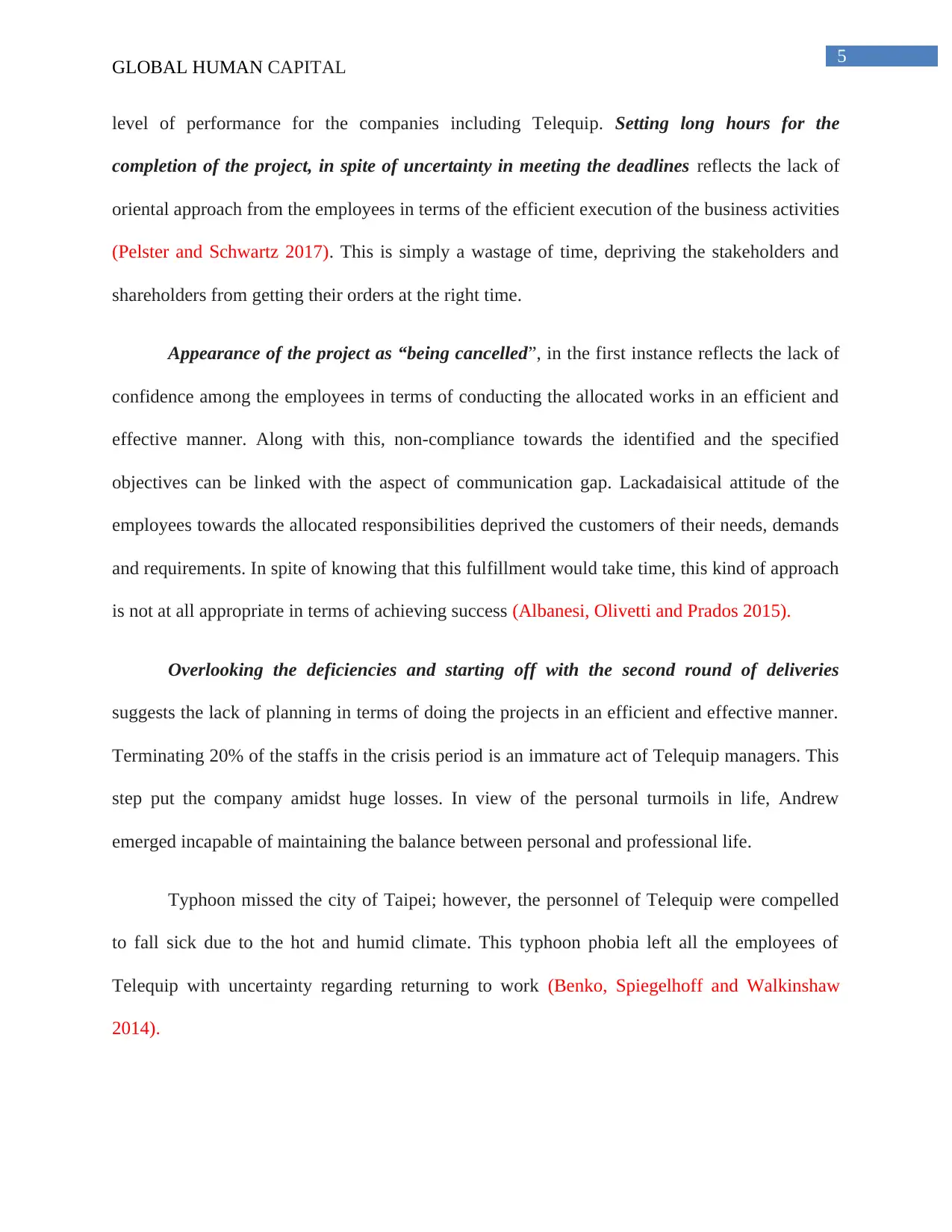
5
GLOBAL HUMAN CAPITAL
level of performance for the companies including Telequip. Setting long hours for the
completion of the project, in spite of uncertainty in meeting the deadlines reflects the lack of
oriental approach from the employees in terms of the efficient execution of the business activities
(Pelster and Schwartz 2017). This is simply a wastage of time, depriving the stakeholders and
shareholders from getting their orders at the right time.
Appearance of the project as “being cancelled”, in the first instance reflects the lack of
confidence among the employees in terms of conducting the allocated works in an efficient and
effective manner. Along with this, non-compliance towards the identified and the specified
objectives can be linked with the aspect of communication gap. Lackadaisical attitude of the
employees towards the allocated responsibilities deprived the customers of their needs, demands
and requirements. In spite of knowing that this fulfillment would take time, this kind of approach
is not at all appropriate in terms of achieving success (Albanesi, Olivetti and Prados 2015).
Overlooking the deficiencies and starting off with the second round of deliveries
suggests the lack of planning in terms of doing the projects in an efficient and effective manner.
Terminating 20% of the staffs in the crisis period is an immature act of Telequip managers. This
step put the company amidst huge losses. In view of the personal turmoils in life, Andrew
emerged incapable of maintaining the balance between personal and professional life.
Typhoon missed the city of Taipei; however, the personnel of Telequip were compelled
to fall sick due to the hot and humid climate. This typhoon phobia left all the employees of
Telequip with uncertainty regarding returning to work (Benko, Spiegelhoff and Walkinshaw
2014).
GLOBAL HUMAN CAPITAL
level of performance for the companies including Telequip. Setting long hours for the
completion of the project, in spite of uncertainty in meeting the deadlines reflects the lack of
oriental approach from the employees in terms of the efficient execution of the business activities
(Pelster and Schwartz 2017). This is simply a wastage of time, depriving the stakeholders and
shareholders from getting their orders at the right time.
Appearance of the project as “being cancelled”, in the first instance reflects the lack of
confidence among the employees in terms of conducting the allocated works in an efficient and
effective manner. Along with this, non-compliance towards the identified and the specified
objectives can be linked with the aspect of communication gap. Lackadaisical attitude of the
employees towards the allocated responsibilities deprived the customers of their needs, demands
and requirements. In spite of knowing that this fulfillment would take time, this kind of approach
is not at all appropriate in terms of achieving success (Albanesi, Olivetti and Prados 2015).
Overlooking the deficiencies and starting off with the second round of deliveries
suggests the lack of planning in terms of doing the projects in an efficient and effective manner.
Terminating 20% of the staffs in the crisis period is an immature act of Telequip managers. This
step put the company amidst huge losses. In view of the personal turmoils in life, Andrew
emerged incapable of maintaining the balance between personal and professional life.
Typhoon missed the city of Taipei; however, the personnel of Telequip were compelled
to fall sick due to the hot and humid climate. This typhoon phobia left all the employees of
Telequip with uncertainty regarding returning to work (Benko, Spiegelhoff and Walkinshaw
2014).
⊘ This is a preview!⊘
Do you want full access?
Subscribe today to unlock all pages.

Trusted by 1+ million students worldwide
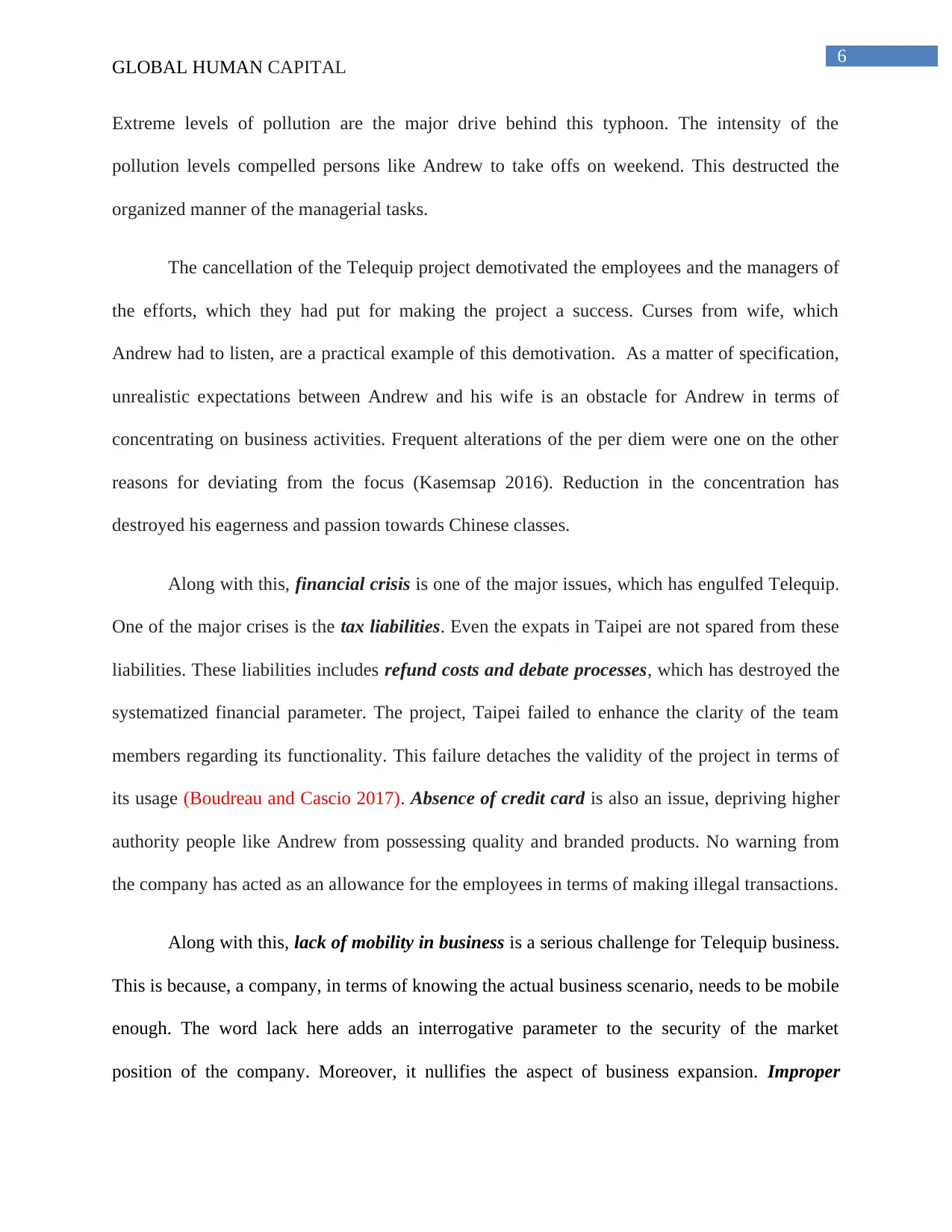
6
GLOBAL HUMAN CAPITAL
Extreme levels of pollution are the major drive behind this typhoon. The intensity of the
pollution levels compelled persons like Andrew to take offs on weekend. This destructed the
organized manner of the managerial tasks.
The cancellation of the Telequip project demotivated the employees and the managers of
the efforts, which they had put for making the project a success. Curses from wife, which
Andrew had to listen, are a practical example of this demotivation. As a matter of specification,
unrealistic expectations between Andrew and his wife is an obstacle for Andrew in terms of
concentrating on business activities. Frequent alterations of the per diem were one on the other
reasons for deviating from the focus (Kasemsap 2016). Reduction in the concentration has
destroyed his eagerness and passion towards Chinese classes.
Along with this, financial crisis is one of the major issues, which has engulfed Telequip.
One of the major crises is the tax liabilities. Even the expats in Taipei are not spared from these
liabilities. These liabilities includes refund costs and debate processes, which has destroyed the
systematized financial parameter. The project, Taipei failed to enhance the clarity of the team
members regarding its functionality. This failure detaches the validity of the project in terms of
its usage (Boudreau and Cascio 2017). Absence of credit card is also an issue, depriving higher
authority people like Andrew from possessing quality and branded products. No warning from
the company has acted as an allowance for the employees in terms of making illegal transactions.
Along with this, lack of mobility in business is a serious challenge for Telequip business.
This is because, a company, in terms of knowing the actual business scenario, needs to be mobile
enough. The word lack here adds an interrogative parameter to the security of the market
position of the company. Moreover, it nullifies the aspect of business expansion. Improper
GLOBAL HUMAN CAPITAL
Extreme levels of pollution are the major drive behind this typhoon. The intensity of the
pollution levels compelled persons like Andrew to take offs on weekend. This destructed the
organized manner of the managerial tasks.
The cancellation of the Telequip project demotivated the employees and the managers of
the efforts, which they had put for making the project a success. Curses from wife, which
Andrew had to listen, are a practical example of this demotivation. As a matter of specification,
unrealistic expectations between Andrew and his wife is an obstacle for Andrew in terms of
concentrating on business activities. Frequent alterations of the per diem were one on the other
reasons for deviating from the focus (Kasemsap 2016). Reduction in the concentration has
destroyed his eagerness and passion towards Chinese classes.
Along with this, financial crisis is one of the major issues, which has engulfed Telequip.
One of the major crises is the tax liabilities. Even the expats in Taipei are not spared from these
liabilities. These liabilities includes refund costs and debate processes, which has destroyed the
systematized financial parameter. The project, Taipei failed to enhance the clarity of the team
members regarding its functionality. This failure detaches the validity of the project in terms of
its usage (Boudreau and Cascio 2017). Absence of credit card is also an issue, depriving higher
authority people like Andrew from possessing quality and branded products. No warning from
the company has acted as an allowance for the employees in terms of making illegal transactions.
Along with this, lack of mobility in business is a serious challenge for Telequip business.
This is because, a company, in terms of knowing the actual business scenario, needs to be mobile
enough. The word lack here adds an interrogative parameter to the security of the market
position of the company. Moreover, it nullifies the aspect of business expansion. Improper
Paraphrase This Document
Need a fresh take? Get an instant paraphrase of this document with our AI Paraphraser
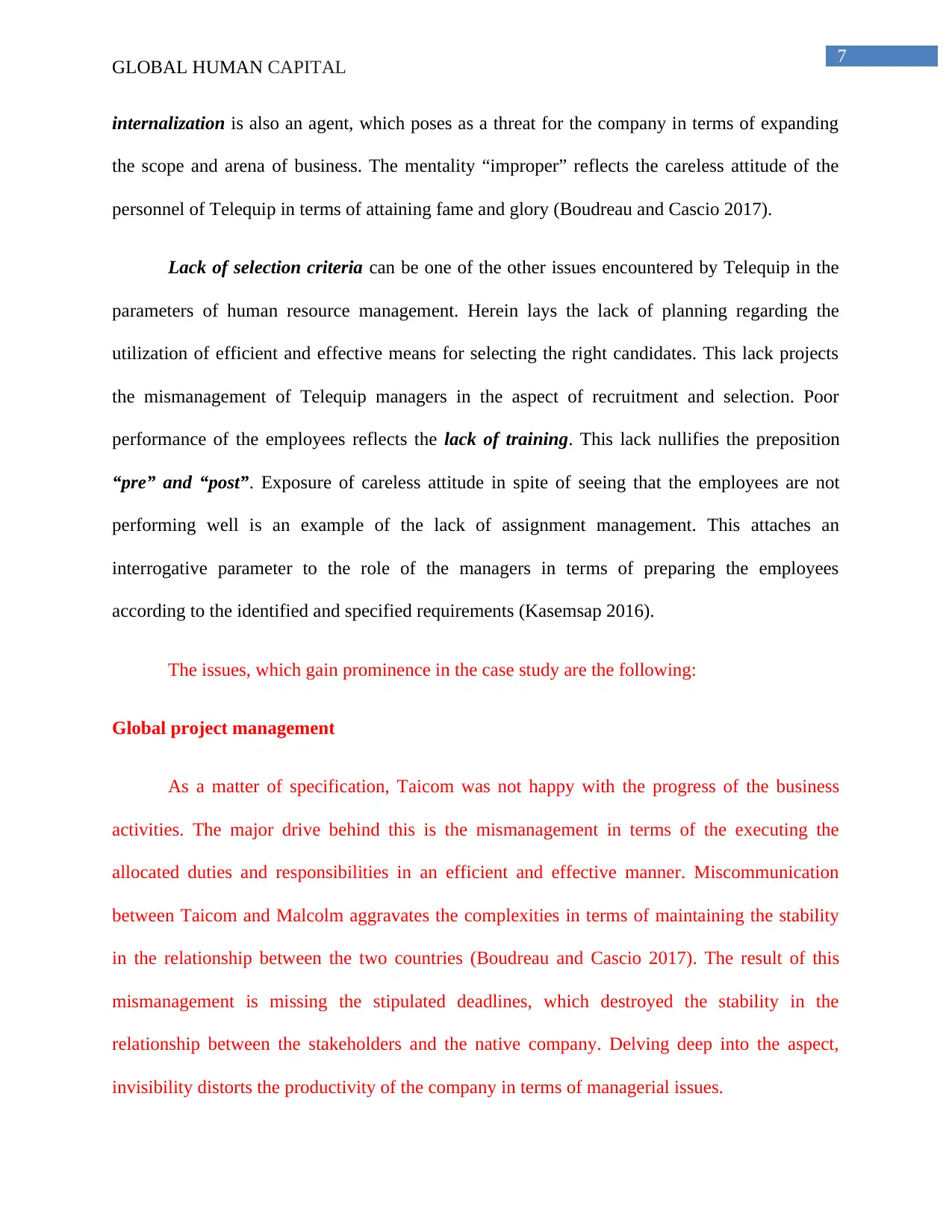
7
GLOBAL HUMAN CAPITAL
internalization is also an agent, which poses as a threat for the company in terms of expanding
the scope and arena of business. The mentality “improper” reflects the careless attitude of the
personnel of Telequip in terms of attaining fame and glory (Boudreau and Cascio 2017).
Lack of selection criteria can be one of the other issues encountered by Telequip in the
parameters of human resource management. Herein lays the lack of planning regarding the
utilization of efficient and effective means for selecting the right candidates. This lack projects
the mismanagement of Telequip managers in the aspect of recruitment and selection. Poor
performance of the employees reflects the lack of training. This lack nullifies the preposition
“pre” and “post”. Exposure of careless attitude in spite of seeing that the employees are not
performing well is an example of the lack of assignment management. This attaches an
interrogative parameter to the role of the managers in terms of preparing the employees
according to the identified and specified requirements (Kasemsap 2016).
The issues, which gain prominence in the case study are the following:
Global project management
As a matter of specification, Taicom was not happy with the progress of the business
activities. The major drive behind this is the mismanagement in terms of the executing the
allocated duties and responsibilities in an efficient and effective manner. Miscommunication
between Taicom and Malcolm aggravates the complexities in terms of maintaining the stability
in the relationship between the two countries (Boudreau and Cascio 2017). The result of this
mismanagement is missing the stipulated deadlines, which destroyed the stability in the
relationship between the stakeholders and the native company. Delving deep into the aspect,
invisibility distorts the productivity of the company in terms of managerial issues.
GLOBAL HUMAN CAPITAL
internalization is also an agent, which poses as a threat for the company in terms of expanding
the scope and arena of business. The mentality “improper” reflects the careless attitude of the
personnel of Telequip in terms of attaining fame and glory (Boudreau and Cascio 2017).
Lack of selection criteria can be one of the other issues encountered by Telequip in the
parameters of human resource management. Herein lays the lack of planning regarding the
utilization of efficient and effective means for selecting the right candidates. This lack projects
the mismanagement of Telequip managers in the aspect of recruitment and selection. Poor
performance of the employees reflects the lack of training. This lack nullifies the preposition
“pre” and “post”. Exposure of careless attitude in spite of seeing that the employees are not
performing well is an example of the lack of assignment management. This attaches an
interrogative parameter to the role of the managers in terms of preparing the employees
according to the identified and specified requirements (Kasemsap 2016).
The issues, which gain prominence in the case study are the following:
Global project management
As a matter of specification, Taicom was not happy with the progress of the business
activities. The major drive behind this is the mismanagement in terms of the executing the
allocated duties and responsibilities in an efficient and effective manner. Miscommunication
between Taicom and Malcolm aggravates the complexities in terms of maintaining the stability
in the relationship between the two countries (Boudreau and Cascio 2017). The result of this
mismanagement is missing the stipulated deadlines, which destroyed the stability in the
relationship between the stakeholders and the native company. Delving deep into the aspect,
invisibility distorts the productivity of the company in terms of managerial issues.
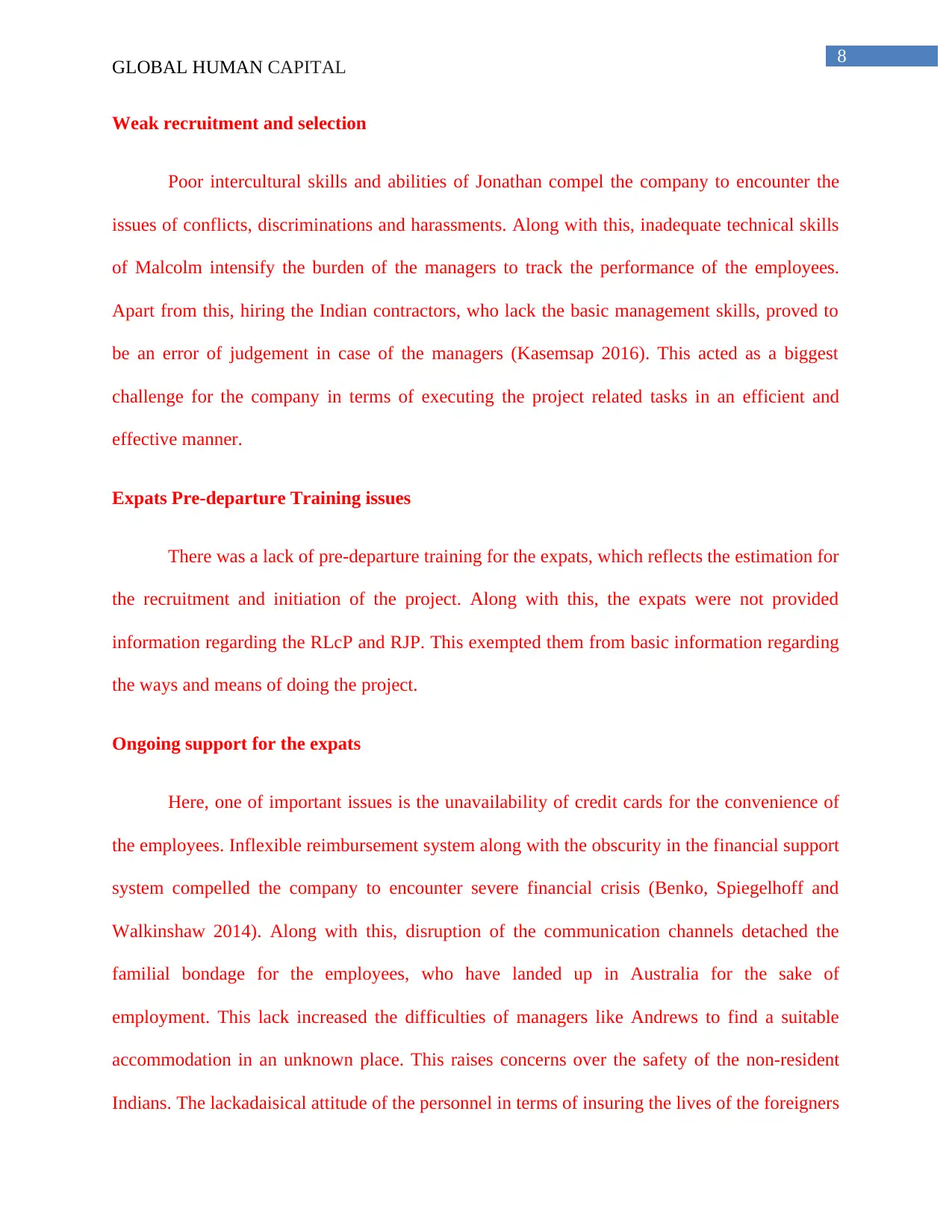
8
GLOBAL HUMAN CAPITAL
Weak recruitment and selection
Poor intercultural skills and abilities of Jonathan compel the company to encounter the
issues of conflicts, discriminations and harassments. Along with this, inadequate technical skills
of Malcolm intensify the burden of the managers to track the performance of the employees.
Apart from this, hiring the Indian contractors, who lack the basic management skills, proved to
be an error of judgement in case of the managers (Kasemsap 2016). This acted as a biggest
challenge for the company in terms of executing the project related tasks in an efficient and
effective manner.
Expats Pre-departure Training issues
There was a lack of pre-departure training for the expats, which reflects the estimation for
the recruitment and initiation of the project. Along with this, the expats were not provided
information regarding the RLcP and RJP. This exempted them from basic information regarding
the ways and means of doing the project.
Ongoing support for the expats
Here, one of important issues is the unavailability of credit cards for the convenience of
the employees. Inflexible reimbursement system along with the obscurity in the financial support
system compelled the company to encounter severe financial crisis (Benko, Spiegelhoff and
Walkinshaw 2014). Along with this, disruption of the communication channels detached the
familial bondage for the employees, who have landed up in Australia for the sake of
employment. This lack increased the difficulties of managers like Andrews to find a suitable
accommodation in an unknown place. This raises concerns over the safety of the non-resident
Indians. The lackadaisical attitude of the personnel in terms of insuring the lives of the foreigners
GLOBAL HUMAN CAPITAL
Weak recruitment and selection
Poor intercultural skills and abilities of Jonathan compel the company to encounter the
issues of conflicts, discriminations and harassments. Along with this, inadequate technical skills
of Malcolm intensify the burden of the managers to track the performance of the employees.
Apart from this, hiring the Indian contractors, who lack the basic management skills, proved to
be an error of judgement in case of the managers (Kasemsap 2016). This acted as a biggest
challenge for the company in terms of executing the project related tasks in an efficient and
effective manner.
Expats Pre-departure Training issues
There was a lack of pre-departure training for the expats, which reflects the estimation for
the recruitment and initiation of the project. Along with this, the expats were not provided
information regarding the RLcP and RJP. This exempted them from basic information regarding
the ways and means of doing the project.
Ongoing support for the expats
Here, one of important issues is the unavailability of credit cards for the convenience of
the employees. Inflexible reimbursement system along with the obscurity in the financial support
system compelled the company to encounter severe financial crisis (Benko, Spiegelhoff and
Walkinshaw 2014). Along with this, disruption of the communication channels detached the
familial bondage for the employees, who have landed up in Australia for the sake of
employment. This lack increased the difficulties of managers like Andrews to find a suitable
accommodation in an unknown place. This raises concerns over the safety of the non-resident
Indians. The lackadaisical attitude of the personnel in terms of insuring the lives of the foreigners
⊘ This is a preview!⊘
Do you want full access?
Subscribe today to unlock all pages.

Trusted by 1+ million students worldwide
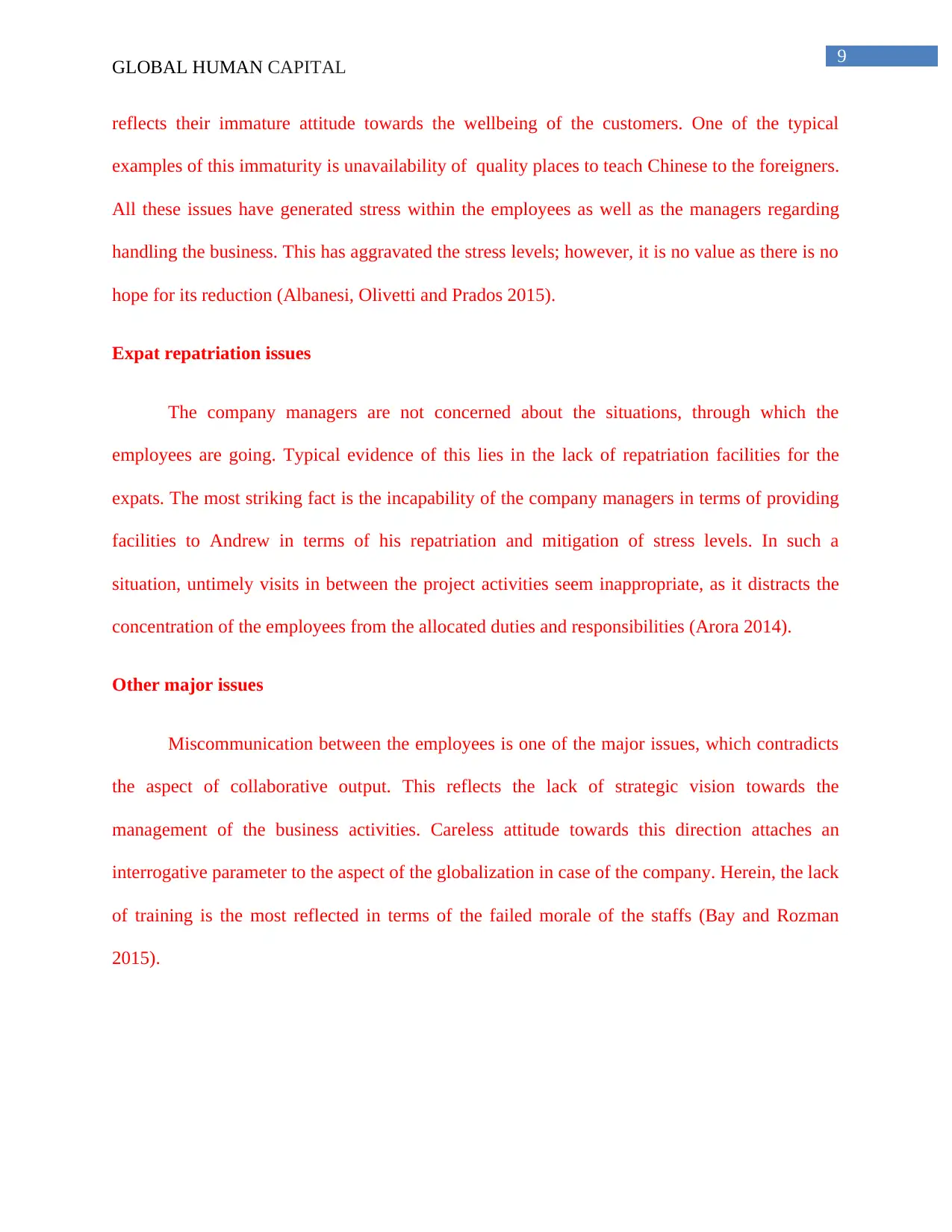
9
GLOBAL HUMAN CAPITAL
reflects their immature attitude towards the wellbeing of the customers. One of the typical
examples of this immaturity is unavailability of quality places to teach Chinese to the foreigners.
All these issues have generated stress within the employees as well as the managers regarding
handling the business. This has aggravated the stress levels; however, it is no value as there is no
hope for its reduction (Albanesi, Olivetti and Prados 2015).
Expat repatriation issues
The company managers are not concerned about the situations, through which the
employees are going. Typical evidence of this lies in the lack of repatriation facilities for the
expats. The most striking fact is the incapability of the company managers in terms of providing
facilities to Andrew in terms of his repatriation and mitigation of stress levels. In such a
situation, untimely visits in between the project activities seem inappropriate, as it distracts the
concentration of the employees from the allocated duties and responsibilities (Arora 2014).
Other major issues
Miscommunication between the employees is one of the major issues, which contradicts
the aspect of collaborative output. This reflects the lack of strategic vision towards the
management of the business activities. Careless attitude towards this direction attaches an
interrogative parameter to the aspect of the globalization in case of the company. Herein, the lack
of training is the most reflected in terms of the failed morale of the staffs (Bay and Rozman
2015).
GLOBAL HUMAN CAPITAL
reflects their immature attitude towards the wellbeing of the customers. One of the typical
examples of this immaturity is unavailability of quality places to teach Chinese to the foreigners.
All these issues have generated stress within the employees as well as the managers regarding
handling the business. This has aggravated the stress levels; however, it is no value as there is no
hope for its reduction (Albanesi, Olivetti and Prados 2015).
Expat repatriation issues
The company managers are not concerned about the situations, through which the
employees are going. Typical evidence of this lies in the lack of repatriation facilities for the
expats. The most striking fact is the incapability of the company managers in terms of providing
facilities to Andrew in terms of his repatriation and mitigation of stress levels. In such a
situation, untimely visits in between the project activities seem inappropriate, as it distracts the
concentration of the employees from the allocated duties and responsibilities (Arora 2014).
Other major issues
Miscommunication between the employees is one of the major issues, which contradicts
the aspect of collaborative output. This reflects the lack of strategic vision towards the
management of the business activities. Careless attitude towards this direction attaches an
interrogative parameter to the aspect of the globalization in case of the company. Herein, the lack
of training is the most reflected in terms of the failed morale of the staffs (Bay and Rozman
2015).
Paraphrase This Document
Need a fresh take? Get an instant paraphrase of this document with our AI Paraphraser
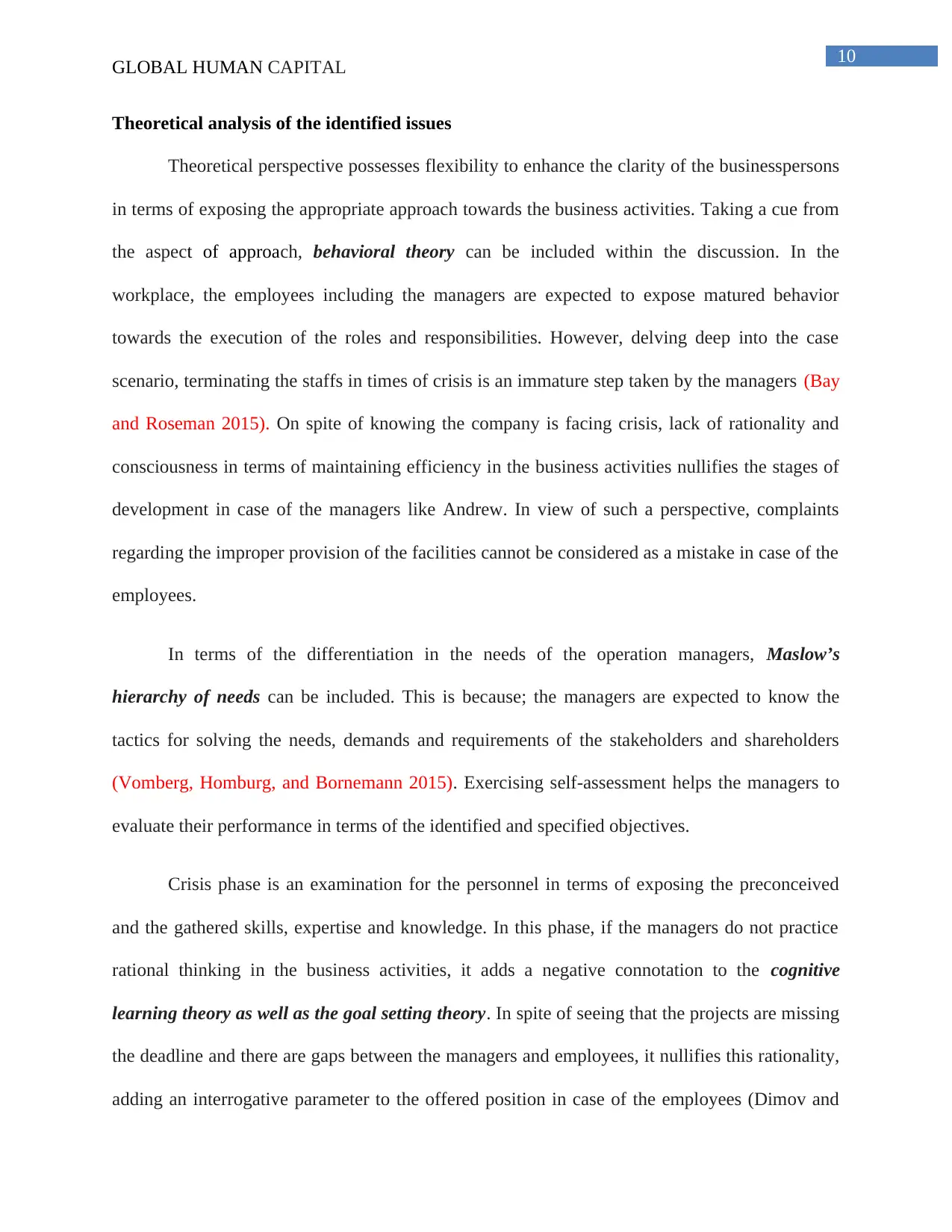
10
GLOBAL HUMAN CAPITAL
Theoretical analysis of the identified issues
Theoretical perspective possesses flexibility to enhance the clarity of the businesspersons
in terms of exposing the appropriate approach towards the business activities. Taking a cue from
the aspect of approach, behavioral theory can be included within the discussion. In the
workplace, the employees including the managers are expected to expose matured behavior
towards the execution of the roles and responsibilities. However, delving deep into the case
scenario, terminating the staffs in times of crisis is an immature step taken by the managers (Bay
and Roseman 2015). On spite of knowing the company is facing crisis, lack of rationality and
consciousness in terms of maintaining efficiency in the business activities nullifies the stages of
development in case of the managers like Andrew. In view of such a perspective, complaints
regarding the improper provision of the facilities cannot be considered as a mistake in case of the
employees.
In terms of the differentiation in the needs of the operation managers, Maslow’s
hierarchy of needs can be included. This is because; the managers are expected to know the
tactics for solving the needs, demands and requirements of the stakeholders and shareholders
(Vomberg, Homburg, and Bornemann 2015). Exercising self-assessment helps the managers to
evaluate their performance in terms of the identified and specified objectives.
Crisis phase is an examination for the personnel in terms of exposing the preconceived
and the gathered skills, expertise and knowledge. In this phase, if the managers do not practice
rational thinking in the business activities, it adds a negative connotation to the cognitive
learning theory as well as the goal setting theory. In spite of seeing that the projects are missing
the deadline and there are gaps between the managers and employees, it nullifies this rationality,
adding an interrogative parameter to the offered position in case of the employees (Dimov and
GLOBAL HUMAN CAPITAL
Theoretical analysis of the identified issues
Theoretical perspective possesses flexibility to enhance the clarity of the businesspersons
in terms of exposing the appropriate approach towards the business activities. Taking a cue from
the aspect of approach, behavioral theory can be included within the discussion. In the
workplace, the employees including the managers are expected to expose matured behavior
towards the execution of the roles and responsibilities. However, delving deep into the case
scenario, terminating the staffs in times of crisis is an immature step taken by the managers (Bay
and Roseman 2015). On spite of knowing the company is facing crisis, lack of rationality and
consciousness in terms of maintaining efficiency in the business activities nullifies the stages of
development in case of the managers like Andrew. In view of such a perspective, complaints
regarding the improper provision of the facilities cannot be considered as a mistake in case of the
employees.
In terms of the differentiation in the needs of the operation managers, Maslow’s
hierarchy of needs can be included. This is because; the managers are expected to know the
tactics for solving the needs, demands and requirements of the stakeholders and shareholders
(Vomberg, Homburg, and Bornemann 2015). Exercising self-assessment helps the managers to
evaluate their performance in terms of the identified and specified objectives.
Crisis phase is an examination for the personnel in terms of exposing the preconceived
and the gathered skills, expertise and knowledge. In this phase, if the managers do not practice
rational thinking in the business activities, it adds a negative connotation to the cognitive
learning theory as well as the goal setting theory. In spite of seeing that the projects are missing
the deadline and there are gaps between the managers and employees, it nullifies this rationality,
adding an interrogative parameter to the offered position in case of the employees (Dimov and
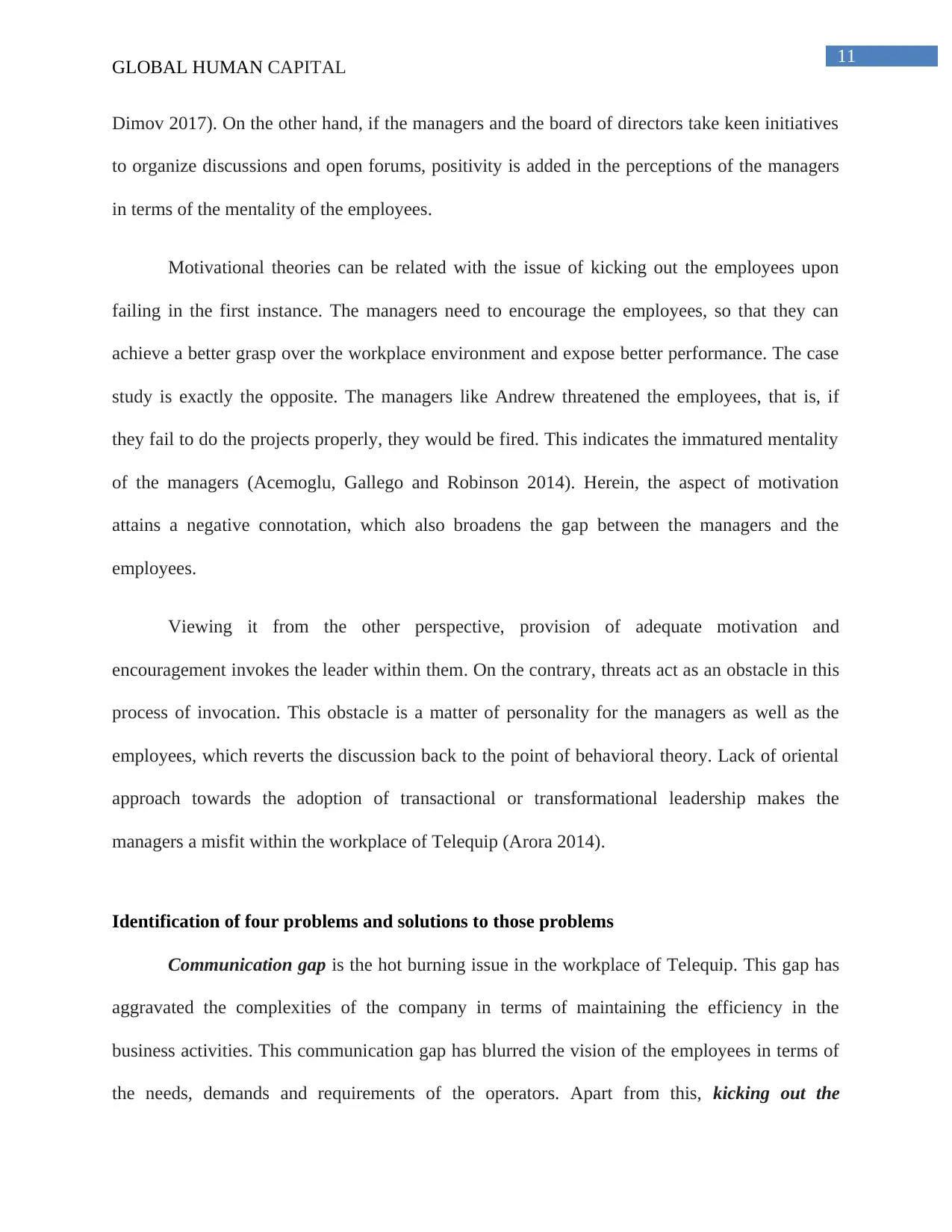
11
GLOBAL HUMAN CAPITAL
Dimov 2017). On the other hand, if the managers and the board of directors take keen initiatives
to organize discussions and open forums, positivity is added in the perceptions of the managers
in terms of the mentality of the employees.
Motivational theories can be related with the issue of kicking out the employees upon
failing in the first instance. The managers need to encourage the employees, so that they can
achieve a better grasp over the workplace environment and expose better performance. The case
study is exactly the opposite. The managers like Andrew threatened the employees, that is, if
they fail to do the projects properly, they would be fired. This indicates the immatured mentality
of the managers (Acemoglu, Gallego and Robinson 2014). Herein, the aspect of motivation
attains a negative connotation, which also broadens the gap between the managers and the
employees.
Viewing it from the other perspective, provision of adequate motivation and
encouragement invokes the leader within them. On the contrary, threats act as an obstacle in this
process of invocation. This obstacle is a matter of personality for the managers as well as the
employees, which reverts the discussion back to the point of behavioral theory. Lack of oriental
approach towards the adoption of transactional or transformational leadership makes the
managers a misfit within the workplace of Telequip (Arora 2014).
Identification of four problems and solutions to those problems
Communication gap is the hot burning issue in the workplace of Telequip. This gap has
aggravated the complexities of the company in terms of maintaining the efficiency in the
business activities. This communication gap has blurred the vision of the employees in terms of
the needs, demands and requirements of the operators. Apart from this, kicking out the
GLOBAL HUMAN CAPITAL
Dimov 2017). On the other hand, if the managers and the board of directors take keen initiatives
to organize discussions and open forums, positivity is added in the perceptions of the managers
in terms of the mentality of the employees.
Motivational theories can be related with the issue of kicking out the employees upon
failing in the first instance. The managers need to encourage the employees, so that they can
achieve a better grasp over the workplace environment and expose better performance. The case
study is exactly the opposite. The managers like Andrew threatened the employees, that is, if
they fail to do the projects properly, they would be fired. This indicates the immatured mentality
of the managers (Acemoglu, Gallego and Robinson 2014). Herein, the aspect of motivation
attains a negative connotation, which also broadens the gap between the managers and the
employees.
Viewing it from the other perspective, provision of adequate motivation and
encouragement invokes the leader within them. On the contrary, threats act as an obstacle in this
process of invocation. This obstacle is a matter of personality for the managers as well as the
employees, which reverts the discussion back to the point of behavioral theory. Lack of oriental
approach towards the adoption of transactional or transformational leadership makes the
managers a misfit within the workplace of Telequip (Arora 2014).
Identification of four problems and solutions to those problems
Communication gap is the hot burning issue in the workplace of Telequip. This gap has
aggravated the complexities of the company in terms of maintaining the efficiency in the
business activities. This communication gap has blurred the vision of the employees in terms of
the needs, demands and requirements of the operators. Apart from this, kicking out the
⊘ This is a preview!⊘
Do you want full access?
Subscribe today to unlock all pages.

Trusted by 1+ million students worldwide
1 out of 17
Related Documents
Your All-in-One AI-Powered Toolkit for Academic Success.
+13062052269
info@desklib.com
Available 24*7 on WhatsApp / Email
![[object Object]](/_next/static/media/star-bottom.7253800d.svg)
Unlock your academic potential
Copyright © 2020–2026 A2Z Services. All Rights Reserved. Developed and managed by ZUCOL.





